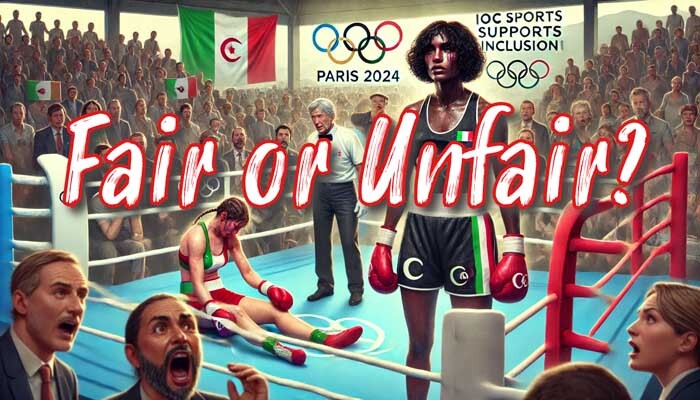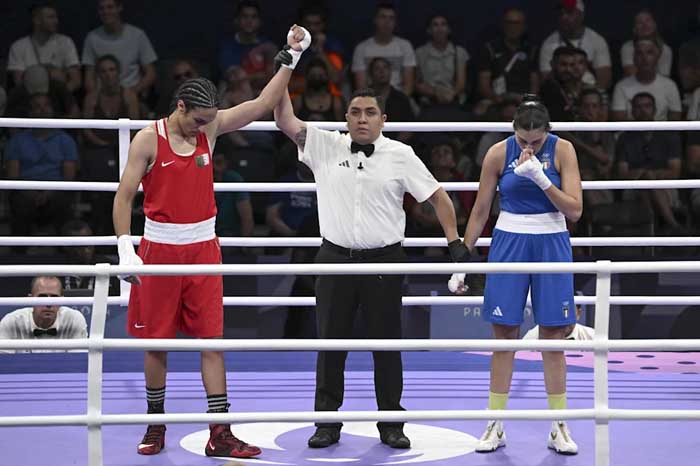
Posted by - News Staff![]() \
\
August 1, 2024 \
Filed in - Sports \
Angela Carini Imane Khelif Gender transition \
1K views \ 0 reviews
DLNews Sports:
When Angela Carini stepped into the Olympic boxing ring, she likely hoped for a reminiscent of the legendary Ali vs. Liston or Schulz vs. Foreman. Instead, a spectacle unfolded and left millions of spectators in shock. The Italian boxer, Carini, was overwhelmed by her opponent, Imane Khelif, within a mere 46 seconds, exiting the ring bleeding and in tears. But the controversy doesn’t end with the lopsided victory; it delves into the intricate world of gender identity and fairness in sports.

Imane Khelif (l.) from Algeria defeated the Italian Angela Carini after only 46 seconds.
Khelif, hailing from Algeria, was barred from the 2023 World Championships due to her male chromosomes. The internet buzzed with questions: Was this a man boxing? A trans woman? The reality is more complex. Khelif was born a woman, carries a woman's name on her passport, and hasn’t undergone any form of gender transition or hormone therapy, which remains illegal in Algeria. The most accurate description, according to gender studies, would be "intersex" – a term referring to someone whose sexual characteristics aren't distinctly male or female.
While social media erupted with misinformed claims, it's important to note that public discomfort over such scenarios doesn't automatically label one as ignorant or prejudiced. People grapple with what they see and hear without the scientific lexicon to articulate their feelings. Not every viewer is versed in terms like intersexuality or gender dysphoria, and a public debate isn’t a scientific symposium.
So, is everything okay? Far from it. Many viewers feel uneasy, sensing something amiss when an official world association disallows an athlete from competing, yet the IOC takes a different stance. This divergence in perspectives fuels public outrage.
Consider Khelif’s position: an athlete passionate about her sport, dedicating years of training and sacrifice. Exclusion due to uncontrollable physical traits would be a harsh blow, potentially ending her career. She deserves respect and understanding, not hate.
On the flip side, Angela Carini's journey is equally compelling. She trained relentlessly for the Olympics, having missed the previous games in Tokyo due to her father's death just before her first-round fight. She then abstained from boxing for two years. Facing an opponent who is biologically and genetically superior is a tough pill to swallow. Khelif’s greater muscle mass and strength translate to harder punches, forcing Carini to concede in under a minute.
It’s not intolerant to struggle with the fairness of such matches. The IOC champions inclusion, rightly valuing its importance. However, fairness remains the cornerstone of sport. Is it fair for a woman to compete against another woman with a chromosomal-genetic-hormonal edge? It’s akin to pitting a boxer against an opponent with superhuman abilities.
The case of swimmer Lia Thomas further complicates the debate. Thomas, born male, has significant physical advantages over her competitors despite her transition. Such scenarios challenge our understanding of fairness in sports.
Today, Taiwanese boxer Lin Yu-ting, like Khelif, competes in Paris after being disqualified in 2023 due to a failed gender test. The International Olympic Committee’s tepid responses do little to quell the growing debate.
Women's participation in all Olympic disciplines since London 2012 is a significant milestone, a far cry from the exclusionary practices of 1896. These athletes deserve their rights to be respected and their competitions to be fair. They’ve fought too hard to be overshadowed by controversy and confusion.
In the end, the integrity of sport hinges on both inclusion and fairness. Striking this balance is the challenge, ensuring every competitor steps into the ring with a fair chance of victory.
The International Olympic Committee (IOC) has officially supported the participation of Imane Khelif and Lin Yu-Ting in the Paris 2024 Olympics despite their previous disqualifications from the 2023 World Championships due to failing gender eligibility tests. The IOC stated that all athletes competing at the Olympics comply with the competition’s rules and applicable medical regulations. They emphasized the importance of inclusion, asserting that athletes should not be excluded from competitions based on physical characteristics, provided they meet the set criteria.

At Desert Local News, connections are everything. We're not just another social networking platform—we're a lively hub where people from all walks of life come together to share stories, spark ideas, and grow together. Here, creativity flourishes, communities grow stronger, and conversations spark global awareness.
Share this page with your family and friends.